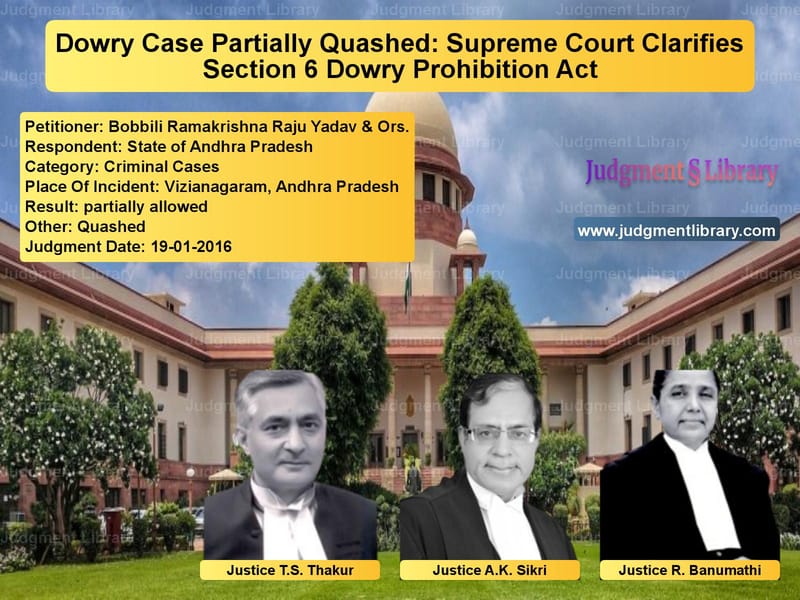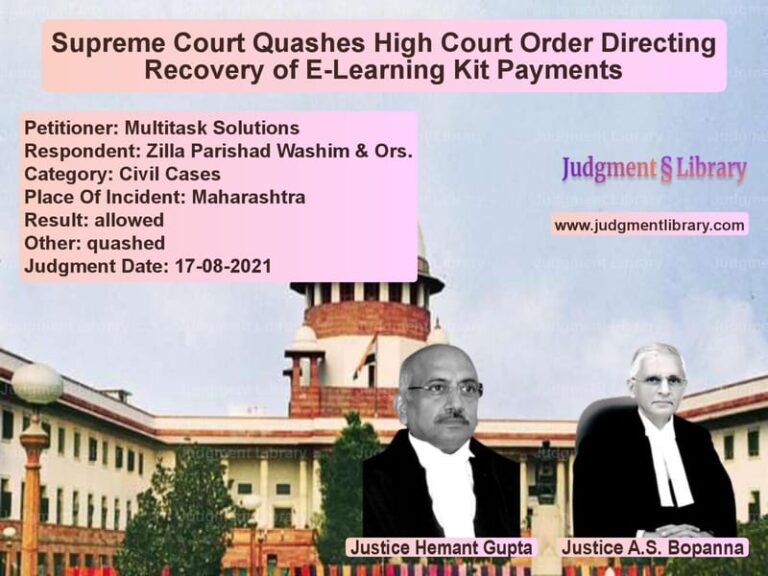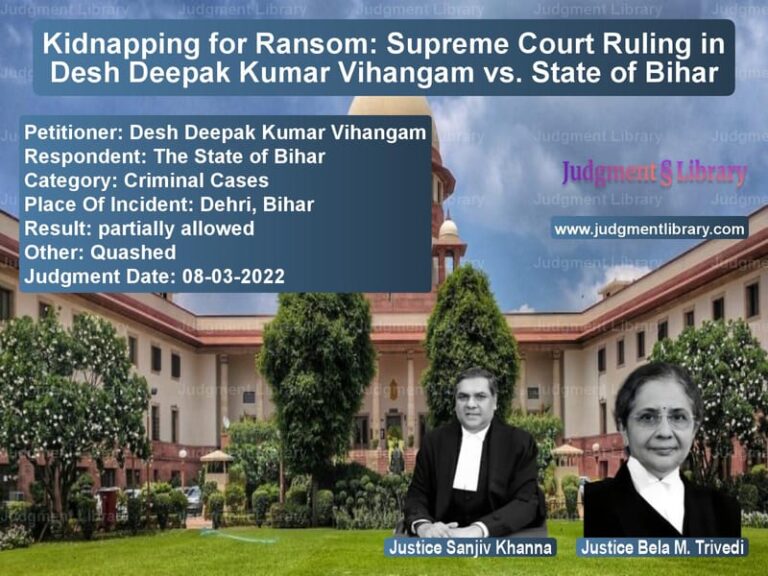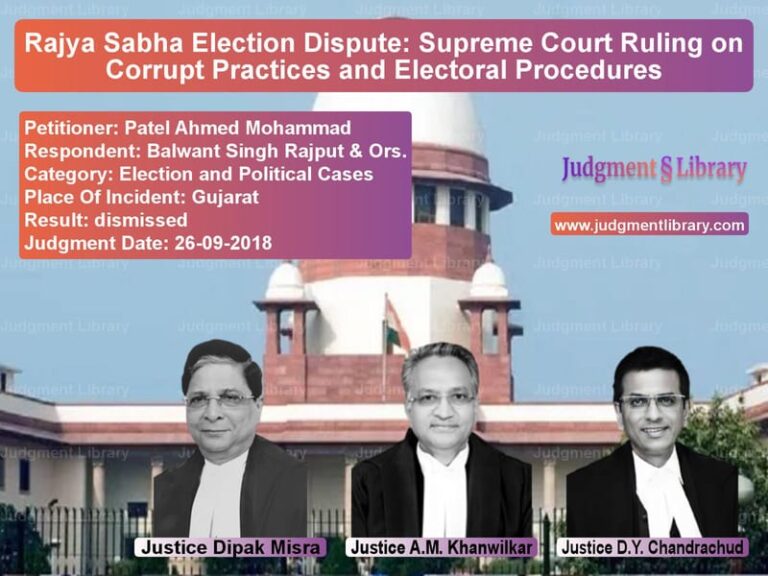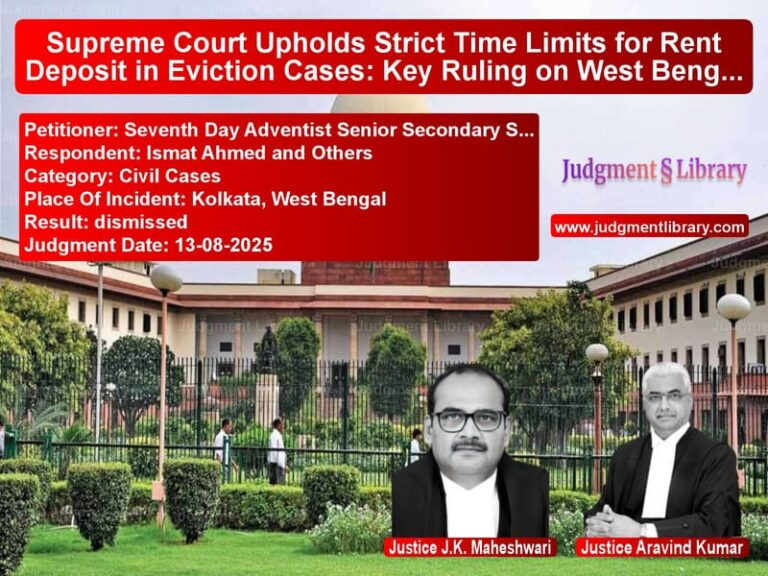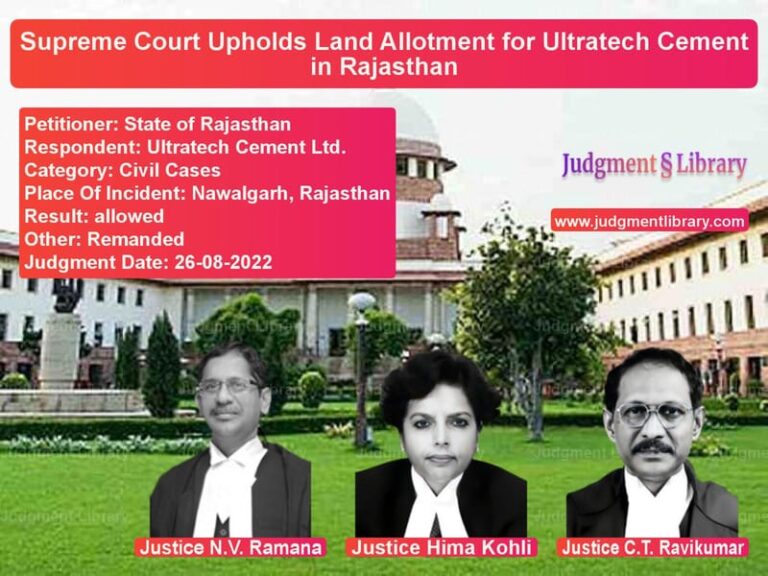Dowry Case Partially Quashed: Supreme Court Clarifies Section 6 Dowry Prohibition Act
The case of Bobbili Ramakrishna Raju Yadav & Ors. v. State of Andhra Pradesh revolves around the application of Section 6 of the Dowry Prohibition Act, 1961. The Supreme Court provided clarity on the necessity of specific allegations in dowry-related offenses and quashed proceedings against some of the accused while allowing the case to proceed against the primary accused.
Background of the Case
The case originated from the death of Syamala Rani, who was married to the first appellant, Bobbili Ramakrishna Raju Yadav. The couple was residing in Bangalore, while the parents and sisters of the first appellant lived in Vizianagaram. Following Syamala Rani’s death under suspicious circumstances on September 6, 2008, an FIR was registered under Sections 304B, 498A of the IPC and Sections 3 and 4 of the Dowry Prohibition Act.
Subsequently, the father of the deceased filed a private complaint under Section 6 of the Dowry Prohibition Act, alleging that he had paid dowry and given other articles which were not returned by the accused after his daughter’s death. The Magistrate took cognizance of the offense and registered it as C.C. No. 532 of 2009.
Key Legal Issues
- Whether the allegations in the complaint sufficiently established an offense under Section 6 of the Dowry Prohibition Act.
- Whether the criminal proceedings should be quashed against certain accused who were not directly involved in the marriage or the possession of the dowry.
- Whether the complaint was an afterthought meant to harass the accused.
Arguments Presented
Appellants’ Arguments
- The appellants argued that the complaint did not disclose any offense under Section 6 of the Dowry Prohibition Act.
- The allegations in the complaint were vague, and there were no specific claims that the dowry was entrusted to appellants 2 to 6 (the parents and sisters of the husband).
- They contended that the complainant had already filed a separate case under Sections 304B and 498A IPC, making this subsequent complaint a misuse of legal provisions.
Respondents’ Arguments
- The father of the deceased argued that the dowry given at the time of marriage was not returned by the accused.
- Despite multiple mediations, the accused refused to return the amount and other gifts given to them.
- Even after the death of the victim, the accused allegedly intimidated the complainant, refusing to settle the matter amicably.
Supreme Court’s Ruling
The Supreme Court ruled in favor of the appellants partially, quashing the proceedings against appellants 2 to 6 while allowing the case to proceed against the husband. The Court made the following key observations:
Section 6 of the Dowry Prohibition Act Explained
- The Court emphasized that for an offense under Section 6, there must be clear evidence that the dowry was entrusted to a person other than the woman and was not returned.
- “The person receiving dowry or who has dominion over it must return it within three months of the marriage; otherwise, he will be guilty of a dowry offense.”
- The Court referenced Pratibha Rani v. Suraj Kumar, which established that the husband or his family members could be held guilty of criminal breach of trust if they fail to return the dowry items.
Lack of Specific Allegations Against Appellants 2 to 6
- The complaint contained vague allegations without specifying which family members received the dowry.
- “Even though the complainant alleged that the dowry was paid at the house of the accused, there were no specific allegations of entrustment to appellants 2 to 6.”
- The Court concluded that a mere allegation of giving dowry did not create a presumption of entrustment under Section 6.
Criminal Proceedings Quashed for Some Accused
- Since the parents and sisters of the husband were living separately in Vizianagaram while the couple resided in Bangalore, there was no evidence that they were in possession of the dowry.
- “In the absence of specific allegations that the dowry was handed over to appellants 2 to 6, the continuation of criminal proceedings against them is not justified.”
- The Court, therefore, quashed the complaint against appellants 2 to 6.
Case to Proceed Against the Husband
- The Supreme Court upheld the prosecution against the first appellant (husband), stating that there was sufficient material to continue the trial.
- The complaint alleged that the husband had custody of the dowry and refused to return it, which fell under the purview of Section 6.
Legal Precedents Considered
The Supreme Court referred to several landmark judgments on dowry-related offenses and quashing of criminal proceedings:
- Madhavrao Jiwajirao Scindia v. Sambhajirao Chandrojirao Angre (1988) 1 SCC 692 – Held that courts should examine whether an offense is prima facie made out before allowing criminal proceedings.
- Pratibha Rani v. Suraj Kumar (1985) 2 SCC 370 – Clarified the legal obligations of a husband and his family regarding a woman’s property in marriage.
- State of Haryana v. Bhajan Lal (1992) Supp (1) SCC 335 – Established guidelines for quashing FIRs and criminal proceedings.
Key Takeaways from the Judgment
- Specific Allegations are Necessary: Vague claims without details of who received the dowry are insufficient for prosecution.
- Protection Against Harassment: Courts must prevent misuse of dowry laws to harass extended family members without evidence.
- Husband’s Responsibility Under Section 6: If the husband is in possession of the dowry and refuses to return it, he can be prosecuted.
Impact of the Judgment
This ruling clarifies the scope of Section 6 of the Dowry Prohibition Act and prevents unnecessary criminal proceedings against individuals who are not directly involved in dowry transactions.
- For Families: It prevents wrongful prosecution of relatives who had no role in handling dowry.
- For Courts: It establishes that cases under Section 6 must be based on concrete allegations.
- For Legal Practitioners: It reinforces the requirement of evidence in dowry-related criminal cases.
Conclusion
The case of Bobbili Ramakrishna Raju Yadav & Ors. v. State of Andhra Pradesh is a crucial judgment in dowry-related criminal law. The Supreme Court ensured justice by quashing baseless proceedings against certain accused while allowing the prosecution to continue against the husband. This ruling strikes a balance between preventing dowry offenses and ensuring legal safeguards against wrongful prosecution.
Don’t miss out on the full details! Download the complete judgment in PDF format below and gain valuable insights instantly!
Download Judgment: Bobbili Ramakrishna vs State of Andhra Prad Supreme Court of India Judgment Dated 19-01-2016.pdf
Direct Downlaod Judgment: Direct downlaod this Judgment
See all petitions in Dowry Cases
See all petitions in Domestic Violence
See all petitions in Alimony and Maintenance
See all petitions in Judgment by T.S. Thakur
See all petitions in Judgment by A.K. Sikri
See all petitions in Judgment by R. Banumathi
See all petitions in partially allowed
See all petitions in Quashed
See all petitions in supreme court of India judgments January 2016
See all petitions in 2016 judgments
See all posts in Criminal Cases Category
See all allowed petitions in Criminal Cases Category
See all Dismissed petitions in Criminal Cases Category
See all partially allowed petitions in Criminal Cases Category

